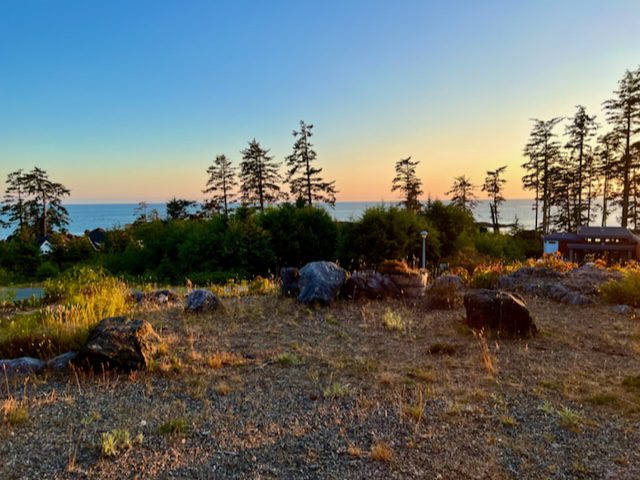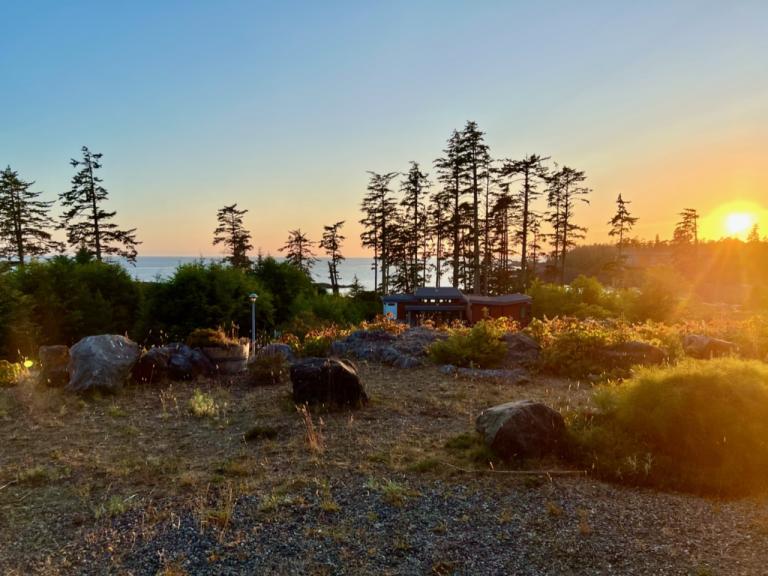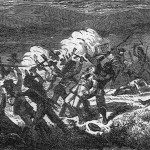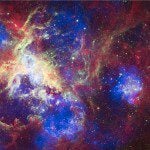
We spent the morning and into the afternoon cruising about from Ucluelet, looking (successfully) for bear. We saw four of them, eating along the shoreline at low tide, in addition to a pair of bald eagles (besides the one that we saw perched atop a tall tree in our own back yard this morning), seven sea otters, maybe a dozen Pacific harbor seals, and (I’m told, because I didn’t actually see it for myself) a porpoise. Moreover, during the short time that I’ve been sitting here, two deer have sauntered slowly across our back patio.
But what I love here most of all is, believe it or not, the place where we’re staying. My wife really outdid herself this time. It’s a very modern condo, with lots of steel and glass and space and with a magnificent view of the sea — a view that is only occasionally interrupted by a deer or an eagle. (We’ve tried to get a photograph that does the view justice, but we haven’t come even close because it’s simply altogether too big.) This is a perfect place for writing. Quiet, beautiful, simple, remote. If I ever do really begin to rake in the big bucks that my more deranged critics continually say that I’ve been stealing from impoverished tithe payers and duped donors, I’ll want to use my ill-gotten gains to come to precisely this condo for three or four weeks of uninterrupted, tranquil, reading and writing. I’m always looking for such places and, here, I’ve definitely found one. A little far from Orem and difficult to reach, but not at all unreasonably so.

As is my habit whenever I travel, I bought several books during our recent stay in the United Kingdom. (I point out to my wife that I could have a worse habit: Instead of books, I could be buying cocaine. To which she often responds that cocaine takes up considerably less space.) Anyhow, included among my purchases were several very small volumes from a series entitled “Little Books of Guidance” that I found in a rural church that some of my wife’s ancestors had probably once attended in a village located not far from Cheltenham.
The one from which I’ll draw for this blog entry is John Cottingham, How can I believe? (London: Society for Promoting Christian Knowledge, 2018). The author, John Cottingham, is Professor Emeritus of Philosophy at the University of Reading, Professor of Philosophy at the University of Roehampton, and an Honorary Fellow of St. John’s College, Oxford:
When the jaded Western tourist looks out from a hotel window in Amman or Marrakesh and hears the strange haunting wail of the call to prayer floating over the city in the clear morning light, he or she may feel a sneaking pang of admiration for a culture where each day still begins with the praise of God. The mess and the grime of another day will soon be unleashed, but here is a timeless moment of affirmation, a brief space set aside to acknowledge the utter dependency of humanity on a power it cannot fully understand but which it has felt a deep need, since time immemorial, to acknowledge.
A similar pang of nostalgia may grip the visitor to Jerusalem as the shops and offices fall silent on Friday evening and the sabbath lamps are lit. None of the difficulty or anguish of human life has disappeared, but here is a brief pause in which secular time gives way to sacred time, a time or renewal and reflection, following a custom passed on down the generations in faith and hope that human life has a deeper significance than the utilitarian imperatives of work and survival. (2)
I like his impresssons here. Having lived for a number of years in Jerusalem and in Cairo and having visited them dozens of times since, I can testify from abundant personal experience of the evocative power of both the Muslim call to prayer and Jewish shabbat observance.
Here, though, is a passage on a different theme:
It would be absurd to say that an atheist’s life cannot contain many worthwhile and meaningful activities. But for the religious believer, human life is typically seen as having an additional significance that is the key to its ultimate meaning — what might be called a cosmic significance. . . .
If the modern scientific materialist conception of the cosmos represents the final truth, then human life, together with love, consciousness and all that we value and treasure, is the result of inexorable physical laws operating blindly, without plan or purpose. It is of no more ultimate significance than an evanescent vapour that coalesces on a planetary rock for a while, as long as certain chemical configurations happen to arise, but is destined sooner or later to vanish, just as the rock itself will vanish, engulfed by the dying embers of the star around which it revolves.
Perhaps, by resolutely pursuing our own chosen activities and projects, we can salvage what meaning we can from this terrifyingly blank and indifferent cosmic backdrop. But however we construe it, our human existence will still be no more than a strange cosmic excrescence appearing and then disappearing without any more ultimate point or purpose than any of the other relentlessly unfolding events — shifting of tectonic plates, collisions of meteors, explosions of supernovas, spinning of galaxies — that mark the slow and inevitable running down of the universe towards the final stasis of total entropy. . . .
Professor Cottingham contrasts this “modern scientific materialist conception of the cosmos” with what he plainly views as the essence of the religious attitude:
It is this kind of vision, this sense of ultimate ‘groundedness’, that led the great twentieth-century philosopher Ludwig Wittgenstein to speak of a religious outlook as involving the feeling of being ‘absolutely safe — I mean the state of mind in which one is inclined to say “I am safe, nothing can injure me whatever happens.”‘ Wittgenstein certainly did not have in mind the naive or superstitious belief that God will protect us from the ordinary dangers of accident, aggression, weakness and failure that are inseparable from human life. What he may have meant was something closer to what has been called a sense of ‘ontological rootedness’ — a sense that, for all its difficulties and dangers, the world we inhabit is one in which we can feel ultimately at home. (8)

(Wikimedia Commons photograph by Roger Sylvia)
No day is ever so bright that something from the Christopher Hitchens Memorial “How Religion Poisons Everything” File™ can’t ruin it! Here are a quartet of deliciously depraved examples from the Hitchens File:
- “See how Latter-day Saints are volunteering in Ecuador, Australia and the Philippines: Following the Lord’s call to serve, members of the Church are getting involved to help those in need”
- “FamilySearch Featured at Smithsonian Folklife Festival: Annual event includes religions in the US”
- “Dialogue at work: Mormons help renovate Catholic seminary gym in Philippines”
- “Unchurched Christians and Anti-Semitic Ones: The best bet to fight far-right anti-Semitism is to hope that America’s lapsed Christians return to the pews.”
Posted from Ucluelet, British Columbia













